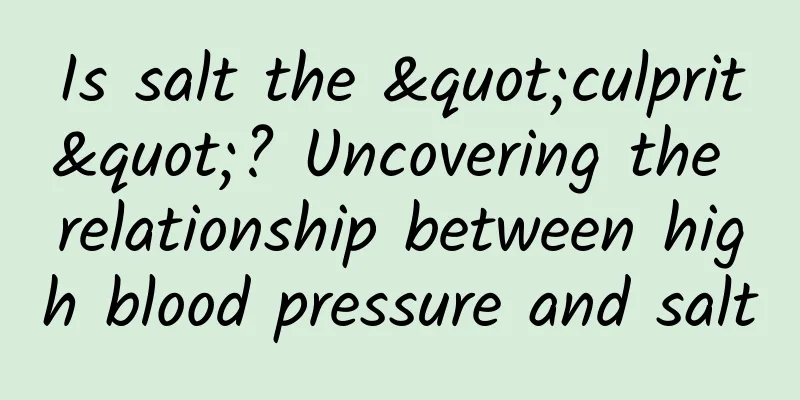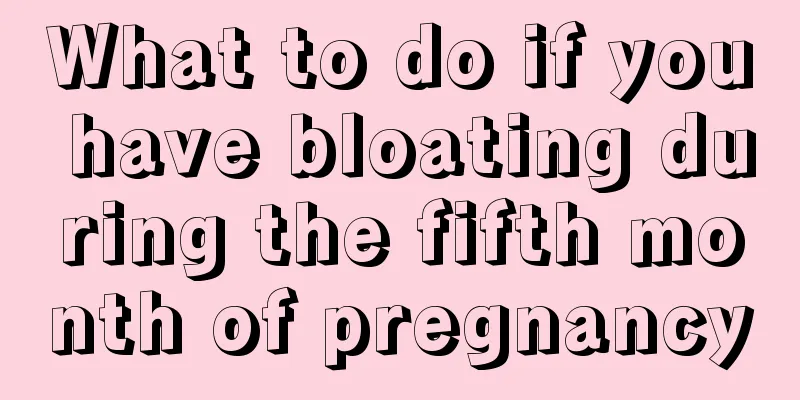Is salt the "culprit"? Uncovering the relationship between high blood pressure and salt

|
Salt is one of the essential condiments in our daily diet, but there is a close relationship between excessive salt intake and high blood pressure. Today, let’s discuss the relationship between salt and high blood pressure. It’s hard to say enough about salt! The relationship between high blood pressure and salt First, we need to understand the definition of hypertension. Hypertension, also known as hypertension, is a chronic disease in which arterial blood pressure continues to rise. Long-term high blood pressure can damage organs such as the heart and blood vessels, and increase the risk of cardiovascular and cerebrovascular diseases. Salt, or the sodium contained in table salt, is one of the main causes of high blood pressure. Sodium ions play an important role in maintaining blood volume and blood pressure stability in the body, but when the intake of sodium ions exceeds the body's needs, it will lead to an increase in blood volume, which in turn increases blood pressure. According to the recommendations of the World Health Organization, the daily sodium intake of adults should be controlled below 5 grams, while China's dietary guidelines recommend that healthy adults should not consume more than 6 grams of sodium per day. So why do we need to control our salt intake? The dangers of high-salt foods First, a high-salt diet increases the risk of high blood pressure. Studies have found that sodium intake is positively correlated with blood pressure levels, that is, the higher the sodium intake, the higher the blood pressure. Data shows that the prevalence of hypertension among Chinese adults is as high as 27.9%, and excessive salt intake is one of the main causes of hypertension. Secondly, a high-salt diet can also have an adverse effect on cardiovascular health. Excessive salt intake can overload the heart and increase the risk of cardiovascular diseases such as heart disease and stroke. In addition, a high-salt diet is closely related to the occurrence of diseases such as chronic kidney disease and gastric cancer. How to control salt intake If you want to control your salt intake, eating less salty food is the key. Salty foods such as pickles, pickled products, and ham sausages have a high salt content, so you should try to eat less of these foods in your daily life. In addition, we should also pay attention to checking food labels. Many processed foods contain hidden salt, so when buying food, check the salt content on the label carefully. It is also very important to control the amount of salt in your meals. You can try using other seasonings to enhance the taste of your food. In addition to controlling salt intake, we also need to pay attention to some other aspects. For example, maintaining good living habits, such as exercising moderately, quitting smoking and limiting alcohol consumption, can effectively reduce the risk of high blood pressure. Developing healthy eating habits and eating more foods rich in dietary fiber, such as fruits, vegetables and grains, can also help control blood pressure. In order to maintain cardiovascular health, we should control salt intake and adopt a proper diet and lifestyle to reduce the risk of hypertension. Let's stay away from hypertension and live a healthier life! |
>>: A brief discussion on matters needing attention during calcium supplementation
Recommend
What is the solution for early ectopic pregnancy?
Once women detect an ectopic pregnancy, they must...
What is the cause of intermittent stomach pain in pregnant women?
In the early stages of pregnancy, pregnant women ...
What is the cause of the small fleshy bumps on the vulva?
I believe that all female friends know the import...
World COPD Day丨People with COPD are more likely to suffer from malnutrition? It’s true!
Many of the patients who visit the respiratory de...
How to wash sensitive parts of women's body
Sensitive part 1: chest Women should wash their b...
What are vaginal tightening exercises?
Most female friends will feel vaginal loosening a...
How do diabetics survive the dog days of summer (Strategy 4)
In the hot summer, walking barefoot on the beach,...
The difference between delayed menstruation and pregnancy
Girls have their menstrual period every month. Wo...
The benefits of sweating while running in summer
Sweating during running is very valuable, because...
Can a banana a day control blood pressure and reduce the risk of heart disease?
Bananas are a popular fruit with a sweet and smoo...
Principles of management of postpartum hemorrhage
We all know that the process of childbirth is par...
How many days after embryo transfer will it implant?
Many women find it difficult to get pregnant. If ...
What is the treatment for uterine fibroids?
The uterus is the female reproductive organ and i...
What to do if you have spotting during 2 months of pregnancy
For many pregnant women, the early stages of preg...
Why do I have frequent urination during menstruation?
Women have all kinds of problems before their per...









